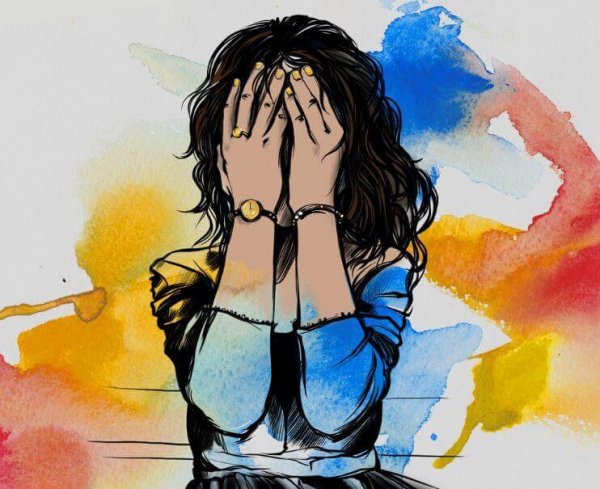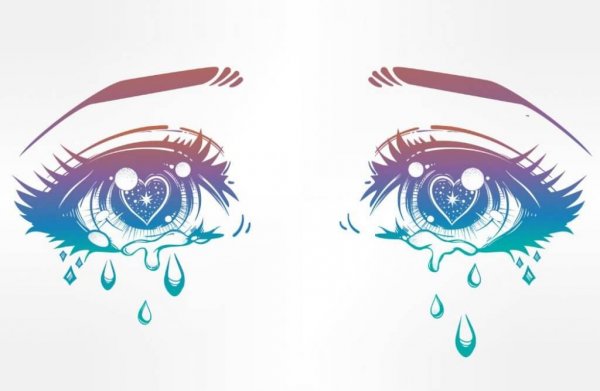Depression Is Harder Than What Metaphors Say

People love using metaphors for depression. It seems that it inevitably brings us sadness, and sadness brings us to an ocean. Or rather, to a deep dark pit from which escape is distant or non-existent. Depression is like an invisible chain.
The invisible chain is tricky because it gags us with weight, not tension, because it’s greased with sadness and not with oil. Its power is to make us believe that we are small and useless. Like we’re losers in this game some people call life.
“Thy strong arms are around me, love
My head is on thy breast;
Low words of comfort come from thee
Yet my soul has no rest.For I am but a startled thing
Nor can I ever be
Aught save a bird whose broken wing
Must fly away from thee.I cannot give to thee the love
I gave so long ago,
The love that turned and struck me down
Amid the blinding snow.I can but give a failing heart
And weary eyes of pain,
A faded mouth that cannot smile
And may not laugh again.Yet keep thine arms around me, love,
Until I fall to sleep;
Then leave me, saying no goodbye
Lest I might wake, and weep”.-Worn Out, Elizabeth Siddal (1829-1862)-

Metaphors about depression: from the outside
Those who see a person with depression from outside come to think that they understand what’s happening. Yes, they really think they do. They claim that they’ve also been sad and have gone through times where they couldn’t see a way out.
That memory left them with the sensation that patience is an underestimated weapon, that our time with sadness is up, although everything around us seems immobile and unimportant.
That’s why those who think they understand try to encourage the depressed person. After all, in their eyes they see something similar to what they went through. However, depression is more than a week of sadness or a struggle deep inside us. Depression is a disorder that few metaphors can properly convey. And is requires professional help.
It’s not only a dark tunnel with no exit. It’s also a tunnel where the air is missing and you can’t breathe. A space where a person cannot move and feels guilty about it. It is a situation where the helplessness of wanting and not being able to reigns. A place where questions bite and everything else is a threat.
A place where value is tarnished and your eyes are protected by a windowpane of tears that don’t always come out. A windowpane that magnifies the negative and turns opaque to opportunities. In the end we’re talking about a place that needs encouragement but even more so, emotional tools and skills.

Depression makes victims guilty
A person with depression is not just a sad person. In fact, they don’t always seem sad. Plus, even though this is the stereotype, it’s not always the emotion that predominates. Many times, especially in children, sadness turns into anger. In adults this also happens because, despite having more emotional regulation tools, deep down there is a struggle and a feeling of frustration from not seeing results.
Yes, anger. Anger that usually is directed at people who try to help, even with real empathy. This face of depression, not as easily recognizable, drives away those who want to help. Maybe they get tired of giving advice or simple, useful solutions that aren’t heeded.
This is when the person with depression can stop being a victim and start feeling guilty. Thus, although they continue to suffer, others may start to think they’re getting comfortable in their depression. They don’t work at it, they do not help at home and they spend all day sleeping. What’s the point of rest if you don’t do anything?
As we’ve seen, depression is a much more complex disorder than just one emotion. And much harder than metaphors can convey. It is deep pain that needs support, but well-directed, smart support. Otherwise, the weight of the support could end up sinking the person even deeper.
Hence the need for good professionals. Because friends are necessary, but they are not enough. They may make the person with depression feel like they’re a depository for advice. If we want to help, let’s not underestimate this disorder. Let’s not invent metaphors for it because metaphors are incomplete, and this viewpoint will infect our way of helping, even if we have the best intentions in the world.
People love using metaphors for depression. It seems that it inevitably brings us sadness, and sadness brings us to an ocean. Or rather, to a deep dark pit from which escape is distant or non-existent. Depression is like an invisible chain.
The invisible chain is tricky because it gags us with weight, not tension, because it’s greased with sadness and not with oil. Its power is to make us believe that we are small and useless. Like we’re losers in this game some people call life.
“Thy strong arms are around me, love
My head is on thy breast;
Low words of comfort come from thee
Yet my soul has no rest.For I am but a startled thing
Nor can I ever be
Aught save a bird whose broken wing
Must fly away from thee.I cannot give to thee the love
I gave so long ago,
The love that turned and struck me down
Amid the blinding snow.I can but give a failing heart
And weary eyes of pain,
A faded mouth that cannot smile
And may not laugh again.Yet keep thine arms around me, love,
Until I fall to sleep;
Then leave me, saying no goodbye
Lest I might wake, and weep”.-Worn Out, Elizabeth Siddal (1829-1862)-

Metaphors about depression: from the outside
Those who see a person with depression from outside come to think that they understand what’s happening. Yes, they really think they do. They claim that they’ve also been sad and have gone through times where they couldn’t see a way out.
That memory left them with the sensation that patience is an underestimated weapon, that our time with sadness is up, although everything around us seems immobile and unimportant.
That’s why those who think they understand try to encourage the depressed person. After all, in their eyes they see something similar to what they went through. However, depression is more than a week of sadness or a struggle deep inside us. Depression is a disorder that few metaphors can properly convey. And is requires professional help.
It’s not only a dark tunnel with no exit. It’s also a tunnel where the air is missing and you can’t breathe. A space where a person cannot move and feels guilty about it. It is a situation where the helplessness of wanting and not being able to reigns. A place where questions bite and everything else is a threat.
A place where value is tarnished and your eyes are protected by a windowpane of tears that don’t always come out. A windowpane that magnifies the negative and turns opaque to opportunities. In the end we’re talking about a place that needs encouragement but even more so, emotional tools and skills.

Depression makes victims guilty
A person with depression is not just a sad person. In fact, they don’t always seem sad. Plus, even though this is the stereotype, it’s not always the emotion that predominates. Many times, especially in children, sadness turns into anger. In adults this also happens because, despite having more emotional regulation tools, deep down there is a struggle and a feeling of frustration from not seeing results.
Yes, anger. Anger that usually is directed at people who try to help, even with real empathy. This face of depression, not as easily recognizable, drives away those who want to help. Maybe they get tired of giving advice or simple, useful solutions that aren’t heeded.
This is when the person with depression can stop being a victim and start feeling guilty. Thus, although they continue to suffer, others may start to think they’re getting comfortable in their depression. They don’t work at it, they do not help at home and they spend all day sleeping. What’s the point of rest if you don’t do anything?
As we’ve seen, depression is a much more complex disorder than just one emotion. And much harder than metaphors can convey. It is deep pain that needs support, but well-directed, smart support. Otherwise, the weight of the support could end up sinking the person even deeper.
Hence the need for good professionals. Because friends are necessary, but they are not enough. They may make the person with depression feel like they’re a depository for advice. If we want to help, let’s not underestimate this disorder. Let’s not invent metaphors for it because metaphors are incomplete, and this viewpoint will infect our way of helping, even if we have the best intentions in the world.
This text is provided for informational purposes only and does not replace consultation with a professional. If in doubt, consult your specialist.







